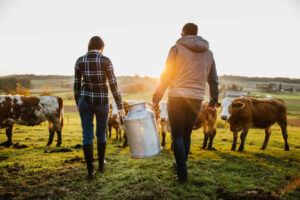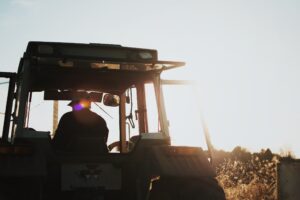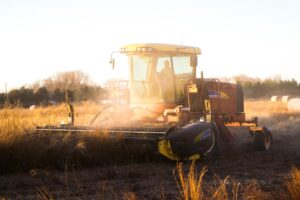A national campaign has been launched to improve farm safety in Britain, with a focus on the dangers of livestock.
 The Your Farm, Your Future campaign was relaunched on 19th February 2024 by the Health and Safety Executive (HSE) after incidents involving livestock were identified as the number one cause of work-related deaths on Britain’s farms in 2022-23.
The Your Farm, Your Future campaign was relaunched on 19th February 2024 by the Health and Safety Executive (HSE) after incidents involving livestock were identified as the number one cause of work-related deaths on Britain’s farms in 2022-23.
Livestock incidents and moving vehicles were responsible for 77 fatalities on farms in the last five years.
The HSE campaign has been relaunched to improve farm safety and support farmers to reduce injuries and save lives, as the agriculture sector remains one of the country’s most dangerous industries to work within.
New advice on livestock to improve farm safety
Last year, Britain’s health and safety watchdog focused on transport safety for their farm safety campaign and they are now relaunching it to provide new advice on working with livestock and assist farmers and their workers to remain safe.
The watchdog says that there are simple, sensible measures that can be taken to keep animals and people apart on farms but that handlers should be in good health, agile and have the physical ability to carry out their role.
In addition to those workers who tragically lose their lives each year, hundreds more are injured on farms in incidents involving moving vehicles and cattle.
The HSE’s Agriculture Lead, Adrian Hodkinson, said:
“Working with cattle and using vehicles are two very common activities in farming, but they bring with them a high risk of being very badly hurt.
“This campaign is focused on work with livestock and aims to stress how important it is to take sensible measures to keep animals and people apart.
“At the same time, we’ll be continuing to highlight the key things for safe use of farm vehicles in and around the yard and sheds, but also out in the fields when checking, feeding, moving and caring for your herd.”
Farm safety focuses on cattle and moving vehicles
 To tackle farm safety, the HSE wants to raise awareness of both cattle safety and farm vehicle safety, as incidents can often involve both.
To tackle farm safety, the HSE wants to raise awareness of both cattle safety and farm vehicle safety, as incidents can often involve both.
Adrian explains: “For example, ATVs (or farm quads) are commonly used on livestock farms. HSE has looked at the reported incidents and many show the user was doing something in relation to farming the animals at the time of the overturn or crash. That’s why we are looking at raising awareness of both cattle safety but also farm vehicle safety.”
The HSE says the number of deaths in the agricultural sector has actually fallen by around half since the early 1980s, but the overall rate of fatalities still remains high and is much higher than in comparable industries.
In the last five years, 161 people have been killed on farms in Britain, including members of the public and children, while data shows that people working on farms are 21 times more likely to be killed in a workplace accident than those working in other sectors.
Adrian said this was a “shocking statistic” with the impact on affected farms being “huge.”
He added:
“Sometimes I see the incident leads to farming work stopping all together, as the key person has life-changing injuries and can no longer work.
“It’s time for us to make a change together to make our farms safer, and that’s why we’re asking farmers in England, Scotland and Wales to consider these areas of their daily farming activities and take the right actions to prevent another farming tragedy.”
New webpages to support farm safety
To support improvements in farm safety, the HSE has developed new dedicated webpages and a checklist for working safely with livestock.
Covering three areas, the advice is aimed at those new to farming and as a refresher for more experienced farmers. It covers:
- Operating a safe farm – where possible keep people and cattle apart
- Safe equipment
- The animal
Adrian Hodkinson acknowledged that British farmers are under “significant pressures” and said the HSE aimed to support the farming community and demonstrate that farm safety needn’t be difficult or expensive.
He said:
“There are simple steps you can take today to help keep you and everyone on your farm safe.
“Farmers and farm workers should take a moment to think about what would happen to their families and their farms if they were seriously injured and unable to work.
“When people on farms start their daily routine, they should follow our advice to help plan the job and complete it safely.”
Health and safety knowledge is key
 First Response Training (FRT) is one of the UK’s largest and leading national training providers.
First Response Training (FRT) is one of the UK’s largest and leading national training providers.
They deliver a wide and diverse range of training for businesses and organisations across all industry sectors and throughout the UK. Their course range includes training in the fields of health and safety, first aid, fire safety, manual handling, mental health, food safety, health and social care and more.
Their health and safety training is mapped to current UK standards and legislation and follows HSE guidelines. It includes training awards in Health and Safety, Managing and Supervising Risk, Working at Height, Manual Handling, Accident and Incident Investigation, and more.
Based on a common sense, proportionate approach to workplace safety, training helps learners to understand the true benefits of creating a healthy and safe environment at work.
A trainer from FRT explains:
“People who work on farms are exposed to many health and safety risks; they may work with potentially dangerous machinery, vehicles, chemicals and livestock and they may carry out hazardous tasks, such as working at height or handling objects and livestock. They are also exposed to the elements, as well as a lot of noise and dust.
“It is vital, then, that farmers and farm workers are aware of the risks and how to prevent, reduce and manage them. They should be aware of their role in workplace health and safety, their legal responsibilities and the steps to take to make their work as safe as reasonably practicable.
“Suitable training is paramount to ensuring that farmers foster a positive farm safety culture on site and that they protect themselves and their workers from avoidable harm.”
For more information on any of the training courses that FRT can provide, please call them today on freephone 0800 310 2300 or e-mail info@firstresponsetraining.com.
